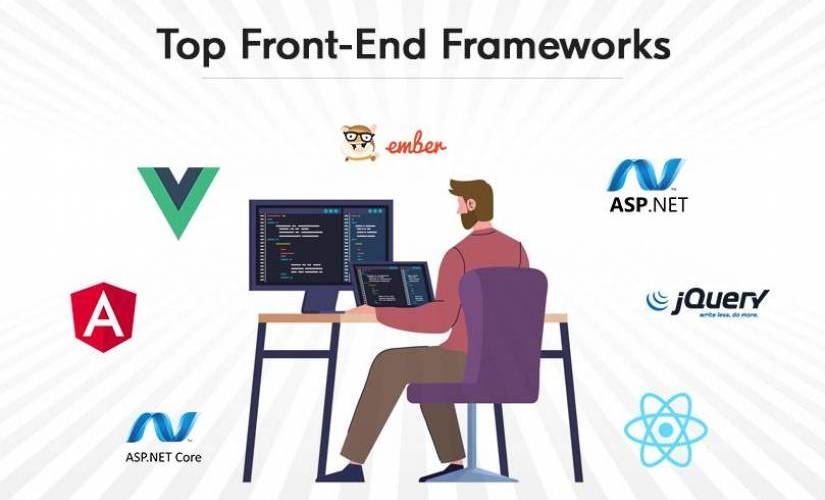7 Best Frontend Frameworks That Accelerate Pace of Web Development

They say one should use the correct ingredient to create the perfect taste. This is especially true for businesses that aim to keep users engaged with the solution they develop. Therefore, it is necessary to concentrate on the UI or the user interface.
In the digital world that we live in, this factor requires focus. This will keep users hooked to the business for a substantially long time.
Here, I will discuss briefly the importance of front-end frameworks in creating interactive websites and offer a list of the top ones recommended for web development.
Before that, let’s understand the meaning of web development in the lines below.
What is Web Development?
Also known as website development, it involves processes for creating, building, and maintaining websites and web apps that can run seamlessly online on the browser.
This follows next by the support it provides in performing tasks like designing app features and functionalities. This is through using languages like HTML, CSS, and JavaScript.
Knowing the meaning of web development, understand that there are three forms of web development. They are frontend, backend, and full-stack.
In the article, I will be discussing front-end development particularly.
What is Frontend Development?
Front-end development refers to that portion of the website that users interact with. This requires developers to know programming languages like HTML, CSS, and JavaScript apart from frameworks like React, Bootstrap, etc.
Now that you have gotten an idea of the meaning of the concept of frontend development- let us understand the framework that makes the task of user interaction with the website a seamless process.
7 Best Frontend Frameworks Recommended for Web Development
- React.js
- jQuery
- Angular
- Express
- ASP.NET Core
- Vue.js
- ASP.NET
Let’s now know about each one of these Frameworks in the lines below.
1. React.js
Year of Release – 2013
Developed by – Meta (Facebook)
A JavaScript library developed by Facebook, formerly known as Facebook, ReactJS helps to create interactive UI. This follows next by the support it provides in web development through building interactive elements for individual websites.
Pros and Cons of Using React.js
Pros:
- Developers can easily make changes within a small component itself.
- Coding components and reusing them without the requirement of rewriting the whole program becomes smooth.
- Has a large population of developers, support becomes easy.
- Indexing by the Google Search Engine is simple.
Cons:
- Writing proper documentation becomes hard. This is due to faster changes and updates taking place.
- It may make developers require to relearn processes due to the slow pace of development in React.js
- Though optional, chances are likely that the JSX present may make new developers confused to a great extent.
- Indexing may sometimes be a struggle on React.js
2. jQuery
Year of Release – 2006
Developers – The jQuery Team
A fast, small and feature-centric JavaScript library, jQuery makes tasks like animation and HTML document traversal seamless.
This follows next by the support it provides in ensuring versatility and extensibility for the website developed using the framework. Therefore, in a nutshell, it goes on to transform the way how developers write JavaScript.
Pros and Cons of Using jQuery
Pros:
- It becomes easy to develop Ajax templates with an advanced set of flexibility. Therefore, developers get the ease to enable a sleeker interface so that actions across web pages become easy to perform.
- The website has a large set of documentation and tutorials. This makes it easy for front-end developers to learn the basics of web development without difficulty.
- Different functions become easy to perform.
Cons:
- Performs slowly in comparison to other CSS.
- Errors may be inevitable if jQuery gets used without a strong foundation of JS.
- Modifications may be vulnerable due to the open-source nature of jQuery.
3. Angular
Year of Release – 2016
Developed by – Google
Known as the modern web developer’s library, Angular provides professionals with the flexibility to accelerate the pace of development for websites. This follows next by the support it gives development experts in gaining ultimate control over scalability. Therefore, it becomes easy to meet data requirements.
Pros and Cons of Angular
Pros:
- Possessing an excellent and rich material design library ensures that the website is of supreme quality.
- The codes present within are readable as well as ready to test.
- Speed and performance of development are accelerated.
Cons:
- Poor accessibility for SEO crawlers makes it difficult to perform tasks to optimize the website.
- With zero server authorization and authentication support, tasks like authorization become difficult. Hence, it also becomes challenging to identify users or ensure smooth and safe data access.
- It becomes a hurdle to predict the most optimized method through which different tasks may get performed.
4. Ember.js
Year of Release – 2011
Developed by – Ember Core Team
An open-source JavaScript web framework, Ember.js or EmberJs assists developers in creating single-page websites. Especially due to the presence of APIs within, therefore, the task of development gets streamlined.
Pros and Cons of Using Express.js
Pros:
- Understanding the written code is easy therefore making contributions to a project for all the developers is a seamless task.
- Data management can be smoothly ensured through it.
- Offers two-way data binding support.
Cons:
- Possessing a complex syntax, hence it might become quite frustrating to work with it.
- Possessing a very less percentage of online resources, therefore learning to use it might be hard.
- Configuration dependency will be more.
5. ASP.NET Core
Year of Release – 2016
Developers – .NET Foundation
A free and open-source framework launched by Microsoft in 2016, ASP.NET Core helps the web deliver fast performance. This follows next by the support it provides in allowing different runtime components, APIs, etc., to evolve with utmost stability at an accelerated pace.
Pros and Cons of Using ASP.NET Core
Pros:
- Serves around 23 times more requests in comparison to its older version (ASP.NET MVC).
- It assists in enhancing general quality as a result of its open-source nature.
- Simplifies IT department routines through the presence of the newly integrated web server Kestrel.
Cons:
- Learning the framework may take a considerably long time.
- Workflow-related services such as Windows Workflow Foundation, Workflow Services, etc., lack plans to get into .NET Core.
- Third-party library support may be missing. Hence, compatibility may become an issue if the class library uses .NET Framework APIs that may not get supported.
6. Vue.js
Year of Release – 2014
Developers – Evan You
An open-source model-view-view model frontend web development JavaScript framework, it helps in the buildup of interactive web user interfaces.
Known for high performance, it is also renowned for using a reactive and compiler-optimized rendering system that hardly requires dependency on manual optimization.
Pros and Cons of Vue.js
Pros:
- It is convenient to use for developing projects that may be complex.
- Facilitates the overall development process.
- It is easy to learn. Possessing a good knowledge of JavaScript is all it takes to start working with the framework.
Cons:
- A narrow community with a small percentage of developers, it is not cut out to be used for large-scale projects.
- Possesses less number of plugins, it might become necessary to switch to other languages.
- Two-way binding may be a task. Hence, you need to flatten codes to achieve seamless data processing.
7. ASP.NET
Year of Release – 2022
Developed by – Microsoft
ASP.NET assists developers to create intuitive and appealing web UI using C#. This ensures that .NET can run in the browser through WebAssembly.
Also, it ensures bi-directional real-time communication between the server and the client. It follows next by support in creating independent and easy-to-deploy microservices that can run smoothly on the Docker containers.
Pros and Cons of ASP.NET
Pros:
- Coding time gets reduced considerably.
- It has unique features within. Therefore enhanced performance and scalability are guaranteed.
- Flexibility and power are easy to achieve through the framework language base made on the common language runtime.
Cons:
- Server licenses and paying for them may be huge. This means you need to invest a good amount of budget.
- Documentation may be difficult.
- Making updates may take a longer time.
Knowing about these frameworks and their different pros and cons, let us assess the criteria that will ensure we make the right choice.
Criteria To Help Make Right Choice for Frontend Framework
- Check their core features and read their documentation carefully.
- Select a framework that is customizable so that configuration is a seamless task.
- Analyze its support in server-side rendering.
Once you have gotten an idea the frontend framework can achieve all these aspects seamlessly, you can go ahead and use it for web development.
Ending Words
Reading this article, you may have an idea of the significance of using the appropriate frontend framework. It will help you create an immersive website with a rich UI to deliver significant business value. While hiring front-end developers- check if they know the pros and cons of the framework they will use for web development. This will ensure you get maximum returns from the site.
The post 7 Best Frontend Frameworks That Accelerate Pace of Web Development appeared first on ReadWrite.
(44)
Report Post




